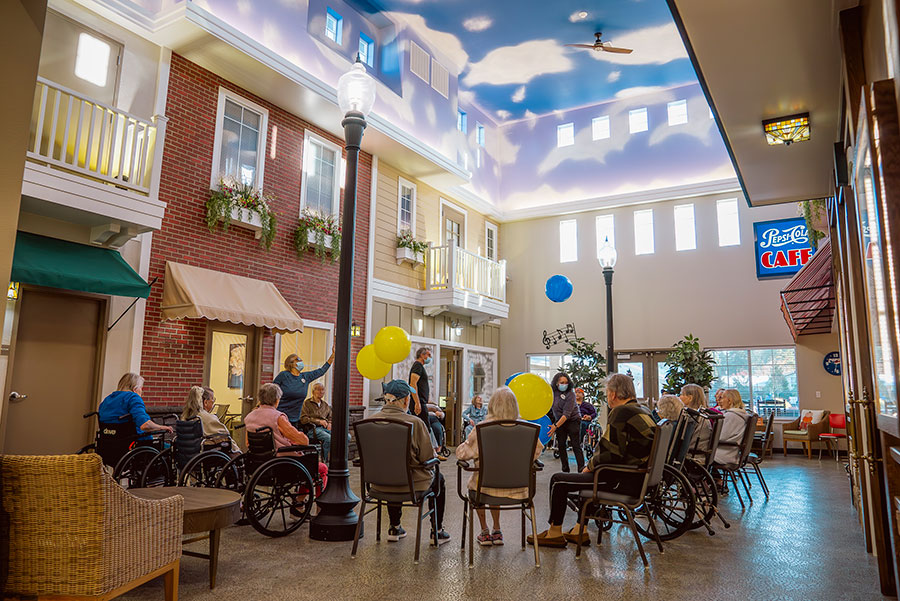All Concerning Memory Care Services: Why Tiny Memory Care Homes Are a Terrific Option
Memory care services play a crucial function in sustaining people with Alzheimer's and mental deterioration. Tiny memory care homes stand apart for their customized technique and intimate setting. With reduced staff-to-resident ratios, these homes cultivate stronger connections and tailored care. Citizens benefit from improved social interactions and a risk-free setting. As families check out options, understanding the one-of-a-kind benefits of tiny memory care homes comes to be essential. What factors should be considered when picking the appropriate home?
Recognizing Memory Treatment Solutions
While many might know with general elderly care options, recognizing memory care solutions is vital for households dealing with the obstacles of cognitive decline. Memory treatment specifically provides to people with problems such as Alzheimer's illness and other kinds of mental deterioration. These services provide a structured setting that focuses on improving the lifestyle for citizens through specialized treatment and support.Memory treatment facilities are developed to ensure safety and security and safety and security, often featuring safeguarded environments to stop straying. Trained personnel are available around the clock to aid with everyday activities, medicine management, and individual care. In addition, memory care programs usually include cognitive stimulation tasks, customized to involve locals and promote mental well-being. Families can gain from understanding these solutions, as they make it possible for educated decisions concerning their loved ones' care, ensuring that their details requirements and choices are dealt with in a supportive and caring manner.
The Benefits of Small Memory Treatment Homes
Small memory care homes use distinct advantages that can significantly boost the quality of life for residents with cognitive disabilities. One considerable advantage is the intimate environment, which enables for customized interactions amongst staff and homeowners. This smaller setup cultivates meaningful relationships, reducing feelings of isolation and anxiety frequently experienced by individuals with memory issues.Additionally, the reduced staff-to-resident proportion in tiny memory treatment homes enables caretakers to supply more mindful guidance and assistance. This technique not only enhances security but additionally advertises a complacency for the residents.Moreover, small memory treatment homes can adjust quickly to the unique requirements and preferences of each homeowner, permitting for a much more homey ambience. Such an atmosphere can urge social interaction and participation in activities, eventually improving the daily experiences of those living with cognitive problems.
Personalized Care Program for Residents
Personalized treatment plans are vital in memory care homes, as they satisfy the distinct demands and preferences of each homeowner. These strategies start with comprehensive assessments performed by skilled experts, who assess cognitive capacities, clinical history, and individual rate of interests. This tailored method guarantees that care is not only efficient yet also respectful of each individual's dignity and autonomy.Moreover, customized treatment strategies are versatile, enabling changes as citizens' requirements advance with time. This versatility promotes a feeling of security and familiarity, which is important for people dealing with memory challenges. Caretakers are educated to implement these plans continually, offering support that lines up with the citizens' routines and preferences.Ultimately, personalized care strategies enhance the lifestyle for citizens by advertising wellness, involvement, and independence, making them a fundamental element of memory treatment services in small memory care homes.
Creating a Home-Like Environment
Producing a home-like atmosphere is important for fostering comfort and familiarity in memory treatment settings, as it greatly impacts citizens' psychological health. Tiny memory care homes often prioritize tailored touches, such as warm shade combinations, household images, and familiar furnishings arrangements, which aid locals really feel much more comfortable. Incorporating aspects reminiscent of a standard home, like cozy space and communal locations, motivates a sense of belonging.Moreover, using all-natural light and outdoor spaces can improve the environment, promoting leisure and serenity. Team participants play a considerable role in maintaining this atmosphere by engaging with citizens in a caring way, treating them like family. Regular tasks, such as cooking or horticulture, can additionally add to a home-like feeling, providing opportunities for residents to get involved in significant experiences. On the whole, producing a nurturing atmosphere supports cognitive function and emotional stability, making it an essential aspect of memory treatment services.
Enhanced Social Communication and Area
Enhanced social interaction and community are necessary components of memory care services. By promoting personalized social engagement and producing a family-like atmosphere, these services promote meaningful connections among citizens. Group occasions and tasks even more motivate engagement, aiding individuals feel more consisted of and sustained.
Personalized Social Involvement
While social communication is important for general health, numerous individuals with memory impairments typically struggle to engage meaningfully with others. Personalized social interaction in memory care homes addresses this challenge by creating customized tasks that deal with citizens' special interests and capabilities. By concentrating on specific choices, caretakers can promote links that resonate deeply with each individual. Tasks such as art treatment, music sessions, and assisted discussions advertise cognitive stimulation and emotional expression. Additionally, little group settings encourage friendship and permit more intimate communications, improving sensations of belonging. This strategy not only deals with feelings of isolation but likewise encourages locals to maintain a feeling of identity, ultimately adding to enhanced psychological wellness and quality of life.
Family-like Environment
In a memory treatment setting, promoting a family-like ambience substantially enhances social communication and builds a sense of area among locals. Smaller memory care homes frequently focus on intimate environments, allowing locals to develop closer links with one another and staff participants. This nurturing atmosphere advertises trust, which is vital for people with memory impairments. Residents are check most likely to involve in conversations and share experiences, producing a supportive network that reduces feelings of isolation. The knowledge of shared areas and routines adds to a sense of belonging, additionally urging social interaction (personalized memory care). In such setups, emotional bonds grow, bring about improved total well-being and a better of life for citizens as they navigate their day-to-day experiences together
Group Activities and Occasions

Safety and Safety And Security Attributes in Small Residences
Several tiny homes developed for memory treatment include crucial safety and security features to guarantee the well-being of homeowners. These homes commonly utilize secure entry and leave points to avoid wandering, an usual issue among individuals with memory impairments. In addition, surveillance systems and alarm mechanisms boost tracking, guaranteeing that staff can promptly respond to any type of uncommon activities.Interior layouts are tailored for safety, with lessened dangers such as clutter-free pathways and sharp edges. Handrails and non-slip flooring are generally set up to reduce the threat of drops. Staff members are educated in emergency procedures, guaranteeing they are planned for different situations.Moreover, personalized care strategies might include assessment of individual security requirements, supplying tailored services for each and every resident. Generally, these safety and safety features produce a nurturing atmosphere where locals can prosper while keeping their dignity and freedom.
Exactly how to Pick the Right Memory Treatment Home
How can family members guarantee they select one of the most suitable memory care home for their enjoyed ones? The decision calls for mindful consideration of numerous elements. Initially, family members ought to review the facility's personnel qualifications and training, ensuring that caretakers are experienced in managing memory-related problems. Next, it's vital to evaluate the home's environment, focusing on security attributes and whether it promotes a feeling of area and belonging. Going to the center can supply understanding right into daily tasks and the social atmosphere, which are essential for mental stimulation and emotional health. Furthermore, family members should ask concerning the treatment strategies provided, ensuring they are customized to specific demands. Taking into consideration the home's location and accessibility for household visits can add to a smoother shift. By dealing with visit our website these facets, family members can make an educated choice that prioritizes their liked one's comfort and top quality of life in a memory treatment setup.
Often Asked Inquiries
What Credentials Should Personnel Members in Memory Treatment Houses Have?
Team members in memory care homes must have appropriate accreditations, experience in dementia treatment, strong interaction skills, and concern. Recurring training in behavior administration and restorative interventions enhances their capability to sustain residents effectively.
Just How Do Memory Treatment Services Differ From Typical Assisted Living?
Memory treatment solutions focus specifically on individuals with memory impairments, offering specific assistance and structured atmospheres. On the other hand, conventional assisted living offers basic support with everyday activities, lacking the customized strategy required for those with cognitive difficulties.
What Kinds of Activities Are Used in Memory Treatment Houses?
Memory treatment homes generally supply a click this site range of tasks designed to engage citizens. Common alternatives consist of art treatment, music sessions, cognitive games, physical exercises, gardening, and get-togethers, all targeted at enhancing well-being and cognitive function.
Can Homeowners Bring Their Own Valuables to Memory Treatment Homes?
Locals can generally bring their very own belongings to memory treatment homes, allowing them to individualize their space - personalized memory care. This practice helps create a familiar setting, promoting comfort and a sense of identification for the people

Just How Are Relative Involved in the Care Process?
Family members play a crucial function in the treatment procedure, typically joining decision-making, participating in care conferences, and providing emotional support. Their participation promotes a joint setting, enhancing the citizen's total wellness and lifestyle. While several might be acquainted with general elderly treatment alternatives, comprehending memory treatment services is necessary for family members dealing with the challenges of cognitive decline. These solutions supply an organized setting that concentrates on enhancing the quality of life for residents via specialized care and support.Memory treatment centers are designed to ensure safety and safety, often featuring protected settings to stop roaming. Individualized treatment plans are essential in memory care homes, as they provide to the one-of-a-kind needs and preferences of each local. Staff participants in memory treatment homes must have relevant accreditations, experience in dementia treatment, strong communication abilities, and empathy. Memory care solutions concentrate particularly on individuals with memory impairments, giving customized support and structured settings.